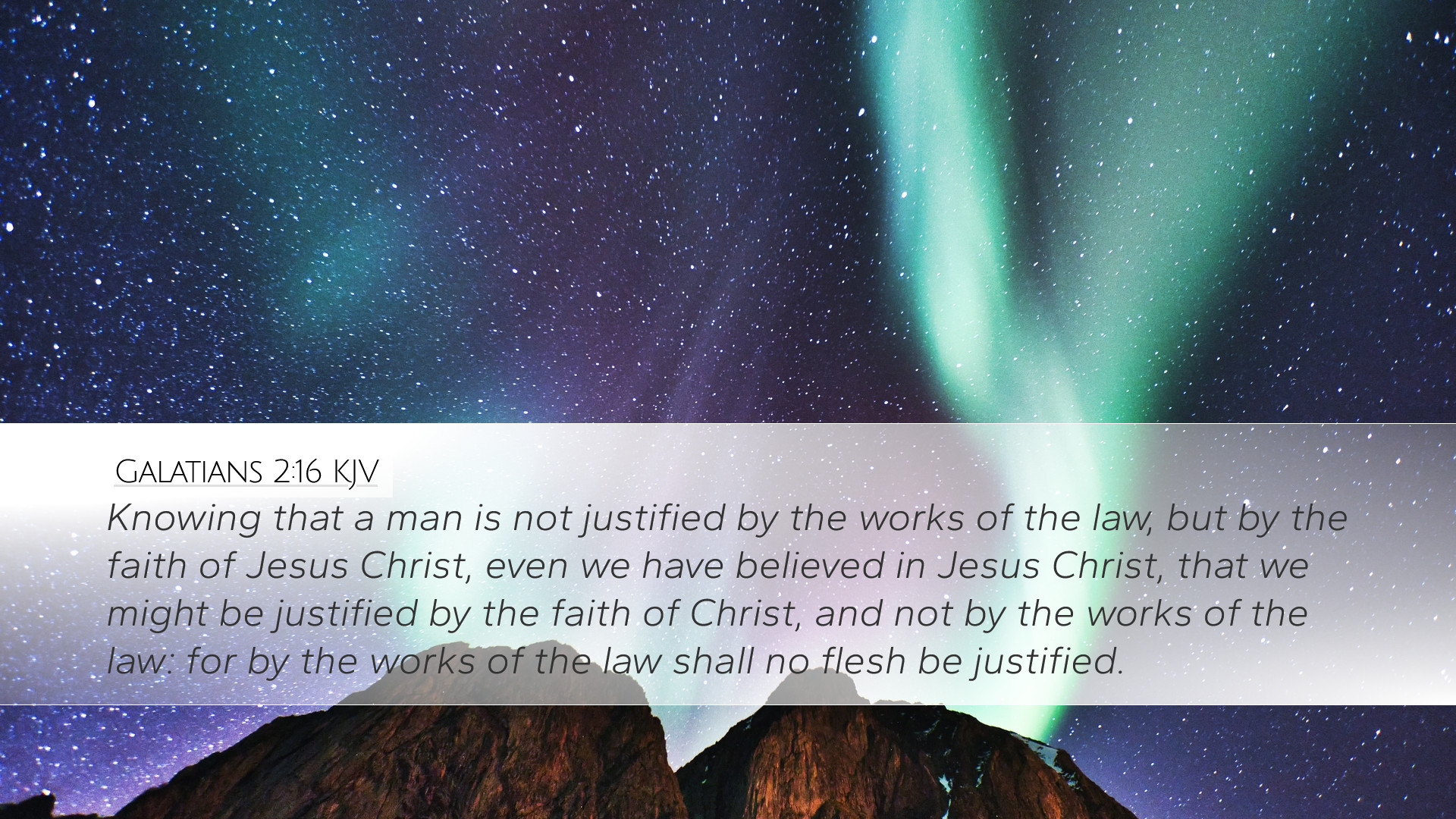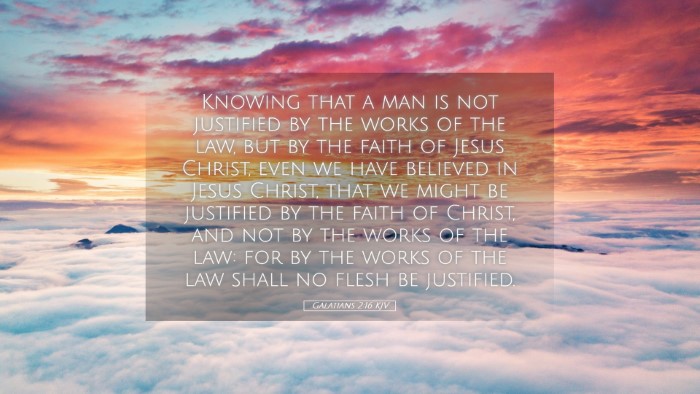Commentary on Galatians 2:16
Galatians 2:16 (KJV): "Knowing that a man is not justified by the works of the law, but by the faith of Jesus Christ, even we have believed in Jesus Christ, that we might be justified by the faith of Christ, and not by the works of the law: for by the works of the law shall no flesh be justified."
Introduction
This passage serves as a doctrinal cornerstone for Pauline theology, emphasizing justification by faith rather than by the works of the Law. Paul’s letter to the Galatians addresses significant issues within the early Christian community, particularly the tension between Judaizers—who advocated for the observance of Jewish law—and those who embraced faith in Christ alone for salvation.
The Nature of Justification
The term “justified” refers to being declared righteous in the sight of God. Matthew Henry articulates that justification is “a most important doctrine, and it is an act of God's free grace.” This assertion binds together the theological implications of salvation, rejecting the notion that human effort can attain divine favor. Paul emphasizes the insufficiency of the Law to justify any person, a point echoed by Albert Barnes who notes, “The law cannot justify because it cannot make a person righteous.”
Adam Clarke furthers this understanding by exploring the relationship between faith and righteousness, indicating that true righteousness comes through faith, thereby nullifying the merit of works. He opines that “the works of the law” refers specifically to Jewish legalism, which cannot produce righteousness but rather exposes the sinfulness of humanity.
Faith and Its Central Role
Central to Paul's argument is the idea that faith in Jesus Christ is the only means by which a person can be justified. Clarke emphasizes that the “faith of Jesus Christ” should be understood as a faith that is actively engaged and thriving, characterized by trust in Christ’s redemptive work. Matthew Henry further clarifies this point by stating, “That faith which is given to us by God, unites us to Christ, makes us partakers of his righteousness, and thus justifies us before God.”
Barnes also highlights the necessary distinction between faith and works, stating, “It is not by faith and works that we can be justified, but solely through faith in Christ.” This reinforces the gracious character of the Gospel, which invites believers to rely entirely on Christ rather than on their own performances or adherence to the law.
The Universal Need for Justification
The assertion that “for by the works of the law shall no flesh be justified” establishes the universal need for salvation. Barnes remarks on Paul’s insistence that the works themselves are incapable of achieving justification, maintaining that all humanity falls short of God’s glory, thus necessitating grace. Clarke notes, “Every human effort, apart from Christ, is rendered ineffective in procuring redemption,” stressing the inherent brokenness of the human condition.
This principle also serves as an equalizer among humanity, dismantling any sense of ethnic or religious superiority. Paul’s argument transcends Jewish and Gentile backgrounds, proclaiming that all are justified solely through faith. Henry points out, “In Christ, every division is brought down, and believers are unified through a common faith.”
The Impact of Justification on the Believer's Life
Understanding justification is vital, not only for doctrinal correctness but also for practical Christian living. The believers, upon recognizing their justification through faith, are liberated from the bondage of legalism. Clarke emphasizes that when one truly understands their standing before God, they will be free to live out their faith animated by love rather than fear of judgment.
Henry adds that this justification leads to a joyful and productive Christian life, where the believer can say, “I am justified, therefore I serve; I am loved, therefore I love.” Living in this truth encourages continual faith and reliance on God's grace and power.
Conclusion
In Galatians 2:16, Paul articulates a profound truth that is foundational to Christian faith: justification does not come through the law or human effort but through faith in Jesus Christ alone. This doctrine, as expounded by Henry, Barnes, and Clarke, remains a critical theme for contemporary believers, theologians, and pastors alike. It challenges individuals to assess the basis of their faith, inviting them to embrace the freedom and assurance found in a relationship with Christ.
As we continue in our study and application of this truth, may we cultivate a faith that is deeply rooted in the grace of God, inspiring others to recognize that in Christ, true justification is not only available but is the very foundation of our being.


